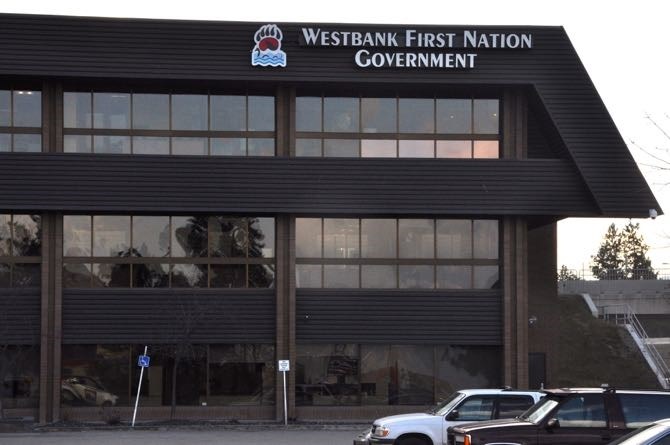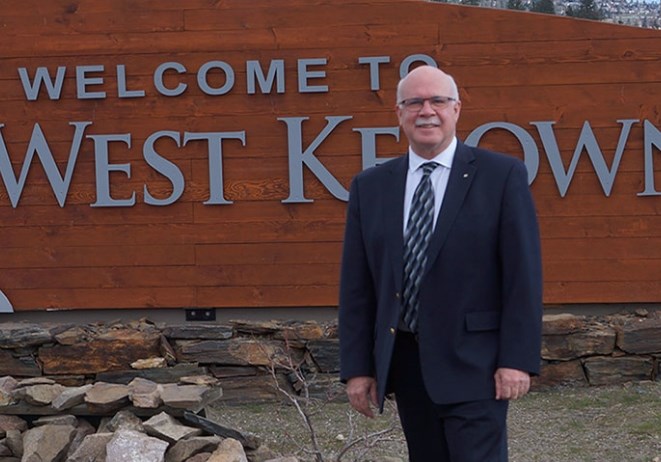
Westbank First Nation office.
(JOHN MCDONALD / iNFOnews.ca)
October 17, 2018 - 9:20 PM
WEST KELOWNA - While contenders for West Kelowna can agree on things like traffic congestion and support for the soccer dome, their views of how council works with its neighbour varies.
As part of our 2018 municipal election coverage, iNFOnews.ca sent out a questionnaire to all candidates in West Kelowna who provided an email address.
We asked: Is West Kelowna doing enough to cooperate with its neighbours, particularly Westbank First Nation? If not, how can this relationship be improved?
Here are key points from their answers, and at the bottom of the page you can see their full response.
We have good working relationships with our neighbours
Rusty Ensign: To improve the relationship (with Westbank First Nation) City Council should continue to offer to have joint meetings with WFN council. Other than that, we have a good working relationship (citing a number of joint agreements).
Carol Zanon: West Kelowna staff meet regularly with their counterparts at Westbank First Nation. Future initiatives will continue to foster this partnership.
We can always do better
Doug Findlater: West Kelowna has inherited some inequitable arrangements from RDCO (Regional District of the Central Okanagan) governance which it has sought to change which can cause acrimony. All jurisdictions work well at the staff level on a day to day basis

Gord Milsom
Image Credit: SUBMITTED/Facebook
Gord Milsom: We need to improve our relationship with our good neighbours … by taking action to listen and learn from each other.
Winston Wammer: We need to cooperate with First Nations and work together to deal with local issues such as infrastructure, roads, facilities, and social problems.
Gordon Wiebe: Our city could show some leadership in this area. We could develop better relations with all the neighbouring jurisdictions by working to harmonize our by-laws procedures and protocols.
Don’t blame us
Rosalind Neis: Cooperation is a two way street – I believe we have at every turn extended our honest and sincere cooperation.
Bryden Winsby: As the old expression goes, it takes two to tango. In most respects, the City of West Kelowna gets along quite well with its neighbours. We’ve had a couple of council-to council meetings (with Westbank First Nation), with mixed results, and I would like to see us get together more often. We must respect the fact we live on traditional indigenous territory.
Not very good, could use a lot of improvement
Jason Friesen: My understanding is that the current council does not have a strong or healthy relationship with WFN or Kelowna. West Kelowna. As a new council, we need to make it a priority to reconcile any differences that exist so that we can move forward together.
Mary Mandarino: This has been an issue with me for a long time. I would like to see a co-joined planning department between us and WFN.
Jayson Zilkie: WFN is a significant partner, and the current relationship can be greatly improved … by working closely with them, brainstorming, round tables and a concentrated effort by council to strategically work together.
These candidates did not respond.
Philip Akins
Jerome Chung
Rick de Jong
Brad Dobbin
Joe Gluska
Stephen Johnston
Tiffany Pare
Full Responses
Rusty Ensign: West Kelowna cooperated with Westbank First Nation to win the Communities in Bloom in 2015. West Kelowna Fire and Rescue has a service agreement with the Westbank First Nation and a recreation service agreement as well. In both agreements WFN residents pay the same per assessed value for these services as residents of West Kelowna. The Greater Westside Board of Trade is comprised of members from both West Kelowna and WFN including a WFN board member. A WFN General Contractor was low bidder and has done the Casa Loma and Boucherie Drainage projects as well as this year’s Webber Road upgrade. To improve the relationship City Council should continue to offer to have joint meetings with WFN council. Other than that, we have a good working relationship.
Doug Findlater: West Kelowna has many interjurisdictional agreements with RDCO, Kelowna, WFN and Peachland. Most of these agreements work well, however, West Kelowna has inherited some inequitable arrangements from RDCO governance which it has sought to change which can cause acrimony. All jurisdictions work well at the staff level on a day to day basis. West Kelowna is always seeking ways to better work with WFN, such as the joint First Services Agreement, Communities in Bloom and community celebrations.
Jason Friesen: My understanding is that the current council does not have a strong or healthy relationship with WFN or Kelowna. It is so important, especially with WFN, that we work and plan together to create a vision for what the greater West Kelowna area could be. As a new council, we need to make it a priority to reconcile any differences that exist so that we can move forward together.
Mary Mandarino: This has been an issue with me for a long time. WFN is our sister government here on the westside and if you took their lands away West Kelowna would not be very big. What happens to them happens to us. I would like to see a co-joined planning department between us and WFN and I will try to initiate that.
Gord Milsom: We need to improve our relationship with our good neighbours, Westbank First Nations, the City of Kelowna, and our other regional partners. These relationships can be improved by taking action to listen and learn from each other, building respect and trust, and discussing ways that we can work together to achieve common goals.
Rosalind Neis: Cooperation is a two way street – I believe we have at every turn extended our honest and sincere cooperation.
Winston Wammer: We need to cooperate with First Nations and work together to deal with local issues such as infrastructure, roads, facilities, and social problems.
Gordon Wiebe: It’s self defeating for our city to operate in isolation. The City of West Kelowna is but one of several intersecting bureaucracies and governing institutions.
There are five civic authorities (Lake Country, City of Kelowna, City of West Kelowna, Peachland and Westbank First Nations), one Regional District, the Interior Health Authority, School District #23, the Okanagan Water Board, former irrigation districts, etc. From a governance perspective, the Central Okanagan is a dog’s breakfast.
Our city could show some leadership in this area. We could develop better relations with all the neighbouring jurisdictions by working to harmonize our by-laws procedures and protocols.
In the future, the big issues faced by residents in the Central Okanagan: traffic, transit, urban development, homelessness, policing, etc. won’t be solved by one body working singlehandedly. We’re all going to have to work collaboratively.
Bryden Winsby: As the old expression goes, it takes two to tango. In most respects, the City of West Kelowna gets along quite well with its neighbours, whether it’s at the staff level or the political level. Occasionally there are differing opinions on how a particular issue should be handled. The issue could be financial. It could be one of policy. It could be a combination of both. Compromise is often the solution, but not always. We’ve had differences with other Regional District of Central Okanagan members over various services, and have withdrawn from some, with little in the way of lingering animosity. We have collaborated with Westbank First Nation on numerous things (Communities in Bloom and the Point in Time homelessness survey, for instance), and we have agreements for provision of services such as police and fire protection. There also have been some significant differences. We’ve had a couple of council-to council meetings, with mixed results, and I would like to see us get together more often. We must respect the fact we live on traditional indigenous territory, but use of non-reserve lands can be a source of conflict between our two governments. The more both sides are willing to communicate objectively, the better, with the understanding, of course, that there will be times when we must agree to disagree.
Carol Zanon: West Kelowna staff meet regularly with their counterparts at Westbank First Nation. Together we won a national award for Communities in Bloom. This Spring the city partnered with WFN, service providers and community groups to complete a point-in-time homelessness count. I support the WFN application to the BC Indigenous Housing Fund, and would advocate for further supportive housing on the Westside. Future initiatives will continue to foster this partnership.
Jayson Zilkie: One of my top priorities is Collaborative Partnerships. I have already connected with many of our trading partners including WFN members, staff and council. WFN is a significant partner, and the current relationship can be greatly improved. This relationship can be greatly improved by working closely with them, brainstorming, round tables and a concentrated effort by council to strategically work together. It would be a high priority to increase working relations and make this partnership more effective.
To contact a reporter for this story, email Rob Munro or call 250-808-0143 or email the editor. You can also submit photos, videos or news tips to the newsroom and be entered to win a monthly prize draw.
We welcome your comments and opinions on our stories but play nice. We won't censor or delete comments unless they contain off-topic statements or links, unnecessary vulgarity, false facts, spam or obviously fake profiles. If you have any concerns about what you see in comments, email the editor in the link above.
News from © iNFOnews, 2018